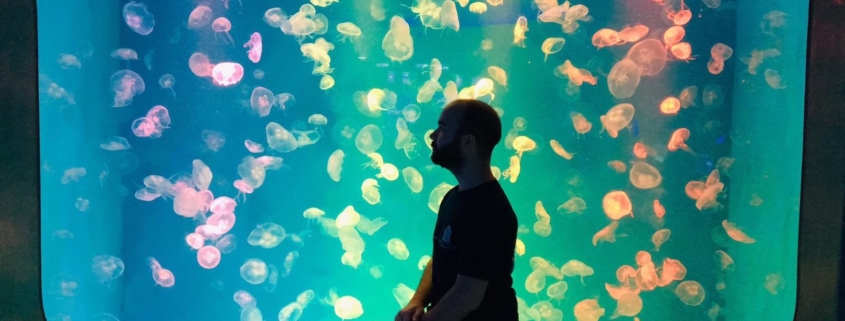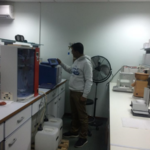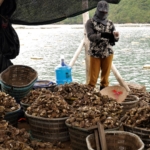From University of Stirling to Mahidol University
This exchange took place between my home institute, the University of Stirling, United Kingdom, and the host institute, Mahidol University (Salaya Campus) in Bangkok, Thailand, specifically the Department of Clinical Medicine and Public Health, Faculty of Veterinary Science. The exchange took place between the 1st – 26th November 2018; and during this period, time was spent between Mahidol University, Bangkok, Burapha University, Bangkok and the Fish Vet Group Asia in Chonburi. The trip combined three major players in education and industry in the field of aquaculture. The aim was to build collaborations between these partners in order to find a common interest that could benefit both parties. It was a honour to be invited by this University to deliver innovative teaching methods to students and professionals, and to build new and strengthen existing collaborations between European and Asian scientists.
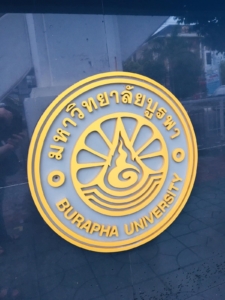
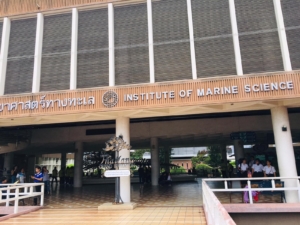
On my arrival, I was welcomed by Assistant Prof. Dr Wanna Sirimanapong and Waruja Korkijthamkul (International Relations, from the Dean’s office) who organised a scheduled tour visit at Mahidol University (Salaya campus). The same day, I met with the Dean of the Faculty of Veterinary Science, Associate Prof. Parntep Ratanakorn, who was very keen to build collaborations between the University of Stirling (UK) and Mahidol University (Thailand), highlighting the importance of mastermind and network. This meeting was very useful in terms of understanding their short-, medium- and long-term vision in research and academia.
My first lecture at Mahidol University took place during the seminar in Aquatic Animal Health, where I delivered a two-hour lecture on “Disease diagnosis and treatment of common parasitic diseases”. The lecture covered approaches to conduct parasitological examination, how to recognise the signs, and the main parasitic diseases that can be encountered, including their control methods. That afternoon I assisted the students in fish anaesthesia, fish dissection, and parasitological examination. At the end of the day, I was pleased to receive a “thank you” token in front of the audience by Prof. Ratanakorn for my visit and for my contribution to education.
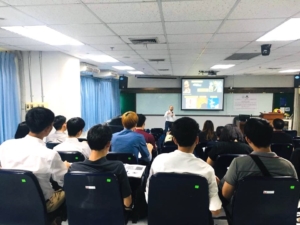
Presenting the first lecture
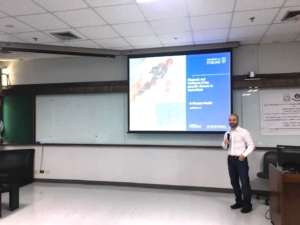
Lecturing Vet students
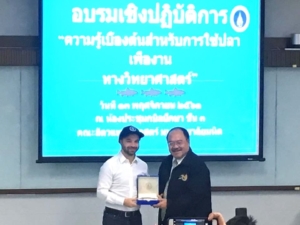
A “Thank you” token by Dean of the Faculty of Veterinary Science, Associate Prof. Parntep Ratanakorn
The following day I delivered a special talk on innovative teaching methods and communication skills. The talk was called “Success through communication: from idea to funding” and I covered topics such as raising finance, active vs passive approach, networking, business plan, and the five ingredients for effective communication. The second part of the lecture covered how to attract research funding, writing tips both for a research proposal and for a scientific article, then moved into poster preparation and presentation.
Finally, I engaged the audience to share advice on oral presentation and provided live feedback for the benefit of all. Innovative methods of teaching were applied here by asking all the students to stand on the stage and dedicate 10 minutes of their time (2 sessions of 5 minutes each) to network with their fellow students, similarly to what normally happens during coffee breaks at conferences. The reason why I gave them only 5 minutes was to get the message across quickly, by explaining why they were at the networking event, what they were hoping to gain and what they were willing to offer. No time was wasted, and the students had to switch their conversation with another person when the first 5 minutes ended. These lectures were particularly engaging as the students did not expect to participate in my talks. I believe that learning and teaching are enhanced by understanding how to effectively communicate. It doesn’t matter the topic, as long as there is passion, burning desire and motivation that drive you (as an educator) to provide a service.
On the 16th November I delivered a special seminar on the first 10 steps to success. This particular lecture explored how a mindset shift can create opportunities in any field. The lecture was attended by 5th year Veterinary students who are going to finish their studies and start planning for the next step in their lives. This was particularly relevant to them as very often students don’t make plans to achieve their goals. Author and entrepreneur Greig S. Reid once said “A dream written down with a date becomes a goal; a goal broken down into steps becomes a plan; a plan backed by action makes your dreams come true”. Many students fail to plan and, therefore, their goals remain just dreams.
To assess the relevance of this special seminar, I have circulated a seminar evaluation form so the students could anonymously provide their feedback. The entire class was happy, grateful, surprised (that this wasn’t taught at school), and motivated to implement the knowledge they gained.
Following the teaching days at Mahidol University, I went to visit Burapha University and the Fish Vet Group Asia aquaculture facilities. I was welcomed at Burapha University by Dr Jarunan Pratoomyot who also studied at the University of Stirling during her PhD. The visit was amazing, and the aquarium facilities were outstanding. Dr Pratoomyot is a fish nutritionist but also the aquarium manager. Given my expertise in fish parasites and her expertise in fish nutrition, we had a productive chat about potential collaborations.
The visit at the Fish Vet Group Asia was also very productive. Dr Andy Shinn, the Director of the FVG Asia, showed me around and introduced me to the staff at ITARC (INVE Tropical Aquaculture Research Centre) and the projects currently running We also had an informal networking event (eating delicious Thai food) with members of staff the who all share common interests in education and research.
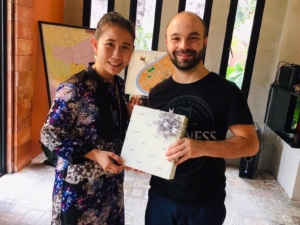
Receiving an amazing present on behalf of Mahidol University from Dr Wanna Sirimanapong
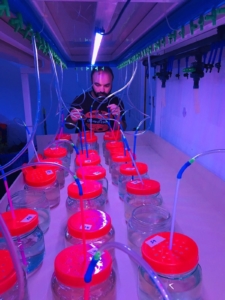
Helping during a drug trial at the FVG facilities in Chonburi
In conclusion, the EURASTiP experience has been an absolute blessing. I had the chance to push myself beyond my comfort zone, to share knowledge and experience with students, and learning new aspects of the Thai culture. This exchange programme is extremely helpful in the personal and professional growth of any educator and researcher. I am very grateful for the opportunity and the support that the EURASTiP Exchange Programme gave me and I will make treasure of every second I spent

